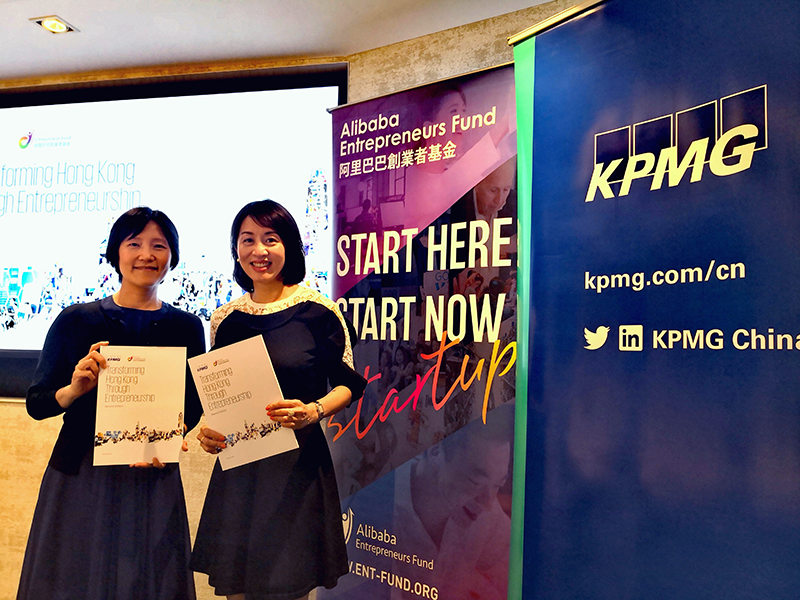
When it comes to Hong Kong as a hub for start-ups, opportunities abound for entrepreneurs in the fintech sector, according to a new study from KPMG China and the Alibaba Hong Kong Entrepreneurs Fund (HKEF).
But better access to funding for all entrepreneurs is needed if the city is to retain its status as a home for founders in Asia, the researched showed.
The annual “Transforming Hong Kong through Entrepreneurship” study found that two-thirds of entrepreneurs believe the development of fintech in the city offers the most promise for start-ups.
Opinions were mixed, however, when it came to three areas that the Hong Kong government has said are critical to its long-term development: smart-city technologies, artificial intelligence and biotechnology, with 48%, 45% and 36% of those surveyed saying they were positive on these sectors, respectively.
“The results suggest a need for continued effort to drive developments across different innovation sectors to enforce Hong Kong’s position as a regional hub for start-ups,” HKEF Executive Director Cindy Chow said in a release announcing the report’s release.

The study was based on surveys of 393 Hong Kong-based entrepreneurs and students, interviews with key opinion leaders, and analysis of venture-capital funding directed at Hong Kong start-ups. Both entrepreneurs and students were asked their opinions on purpose, ambition and entrepreneurial mindset, entrepreneur capabilities and the ecosystem as a whole.
The respondents noted that while venture-capital investment in Hong Kong start-ups over the past six years has soared more than 20 times and the average deal size for private VC investments has risen more than 35 times, gaps in access to formal sources of funding remain. That includes private equity, crowd funding, government funding and bank loans, in addition to venture capital. For example, 20% of entrepreneurs polled say they currently use VC funding compared to 70% who lean on their own savings to fund their businesses.
Still, 70% of those surveyed said that Hong Kong is a dynamic and vibrant location for start-ups, up from 56% last year. The ease of doing business in Hong Kong is still the city’s major competitive advantage, with its position in Asia and access to funding expected to rise in importance by 2022. Challenges faced by founders in the city included Hong Kong’s well-known high costs and a lack of support services for companies that have moved beyond early stages of operation to the growth and mature stages.
This year, HKEF and KPMG China introduced for the first time the Hong Kong Entrepreneurship Development Index, which tracks current perceptions and the future outlook for 10 factors related to purpose and capabilities that were measured in the survey, ranging from risk acceptance and opportunity perception to regulatory environment and access to capital.
According to the index, Hong Kong’s start-up ecosystem is at a “critical juncture” and actions taken by both the government and the business community will determine whether or not the city becomes a vibrant ecosystem.
“Our Hong Kong Entrepreneurship Development Index suggests that Hong Kong has an opportunity to significantly improve its entrepreneur ecosystem by focusing efforts on community support, financial ambition and access to capital,” said Irene Chu, partner and head of new economy and life sciences for KPMG China.
Among the recommendations in the report, HKEF and KPMG China suggested:
- Both government and the business community should expand offerings to better support growth stage and mature stage start-ups.
- Founders should prioritize sourcing formal funding by elevating their financial ambition, accelerating global market entry and engaging mentors throughout the lifecycle.
- International private equity and venture capital firms should utilize changes to profit tax exemptions announced for Hong Kong, and the government should continue to promote these exemptions as well as the other benefits Hong Kong offers as a regional fund management center.
- As founders build technology start-ups, they should ensure they are also building a people business that enables growth.
- Government agencies, corporates and other industry players should better educate the wider community on the irreplaceable value of start-ups.
How will Hong Kong rate as a start-up hub against other Asian cities by 2025? Click here to read the full report.




